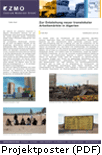 The Emergence of New Translocal Labor Markets in Algeria
The Emergence of New Translocal Labor Markets in Algeria
Dalila Nadi
Today, the earnings from petroleum that were accumulated during
Algeria’s pe-riod of political crisis are being used to
reconstruct the country, with Chinese companies playing an increasingly
important role. Because of their longstanding political and ideological
closeness, the People’s Republic of China and Algeria enjoy
privileged relations. Historically, the two countries shared common
eco-nomic values and socialistic ideologies and today, both are
attempting to make the big leap into the free-market economy.
But this is happening on the basis of different concerns and
strategies: China seeks to develop new markets on the African
continent using Algeria as the star-ting point for expanding its
trade, while Algeria’s choice of trading partner was heavily
influenced, among other things, by the favorable conditions that
China offers. In particular, Algeria’s building sector is
increasingly dominated by Chi-nese companies that recruit, among
others, Africans who are en route to Europe to work on their construction
projects.
.Dalila Nadi investigates the interactions in Algeria’s
building sector between the Algerian state and Chinese companies
on one hand, and immigrants from sub-Saharan Africa on the other.
There’s a new development in Algeria: Many Chinese and
African migrant la-borers, seeing new opportunities in Algeria’s
economic boom, decide to settle there after their work contracts
have expired. These new spaces of interaction and conflicts of
interest are examined against the background of social, political
and economic aspects. The implications of both the Chinese government’s
investments and the reality of Chinese and sub-Saharan immigrants
increasingly becoming established in Algeria’s private sector
are also addressed.
|